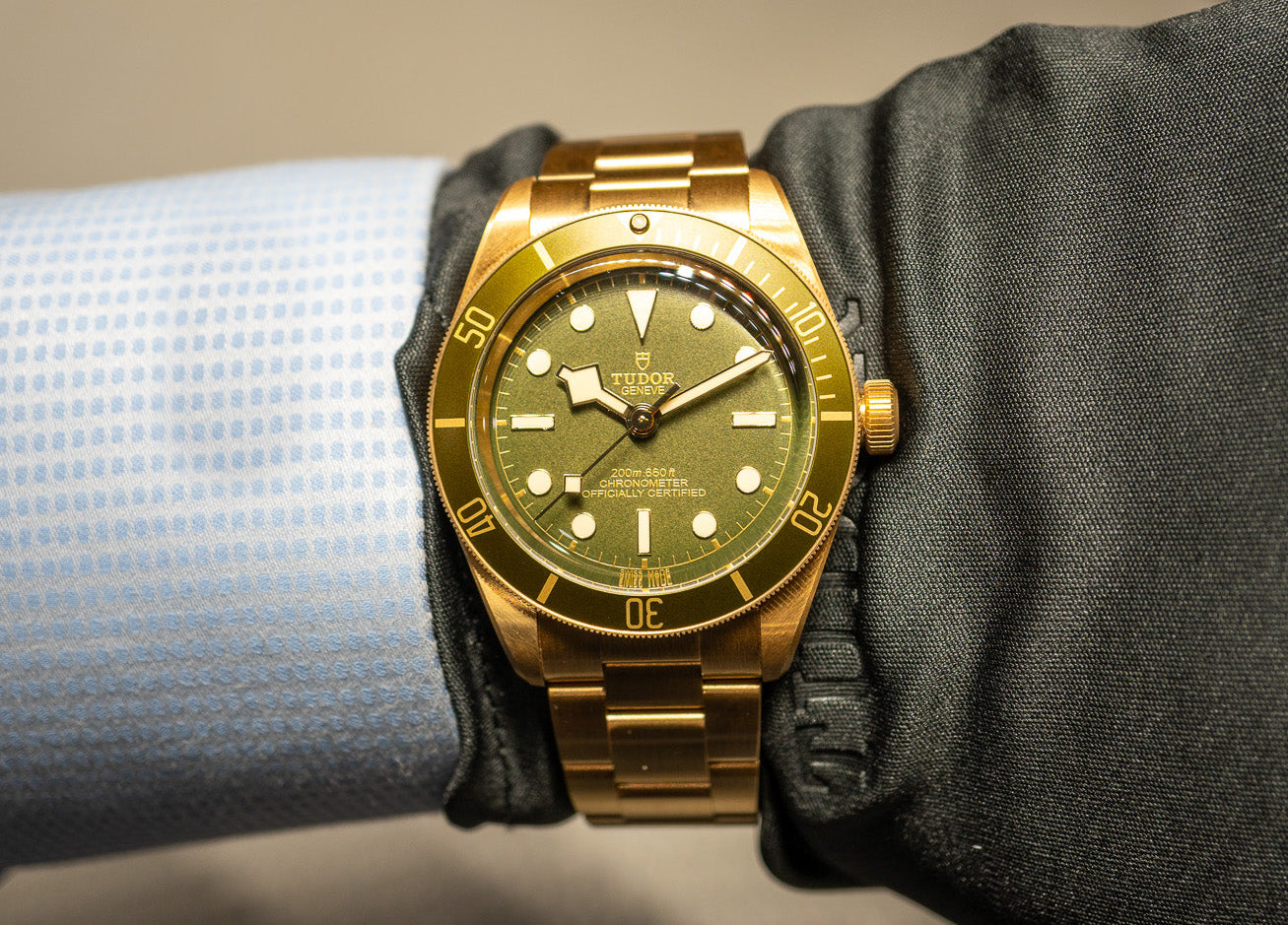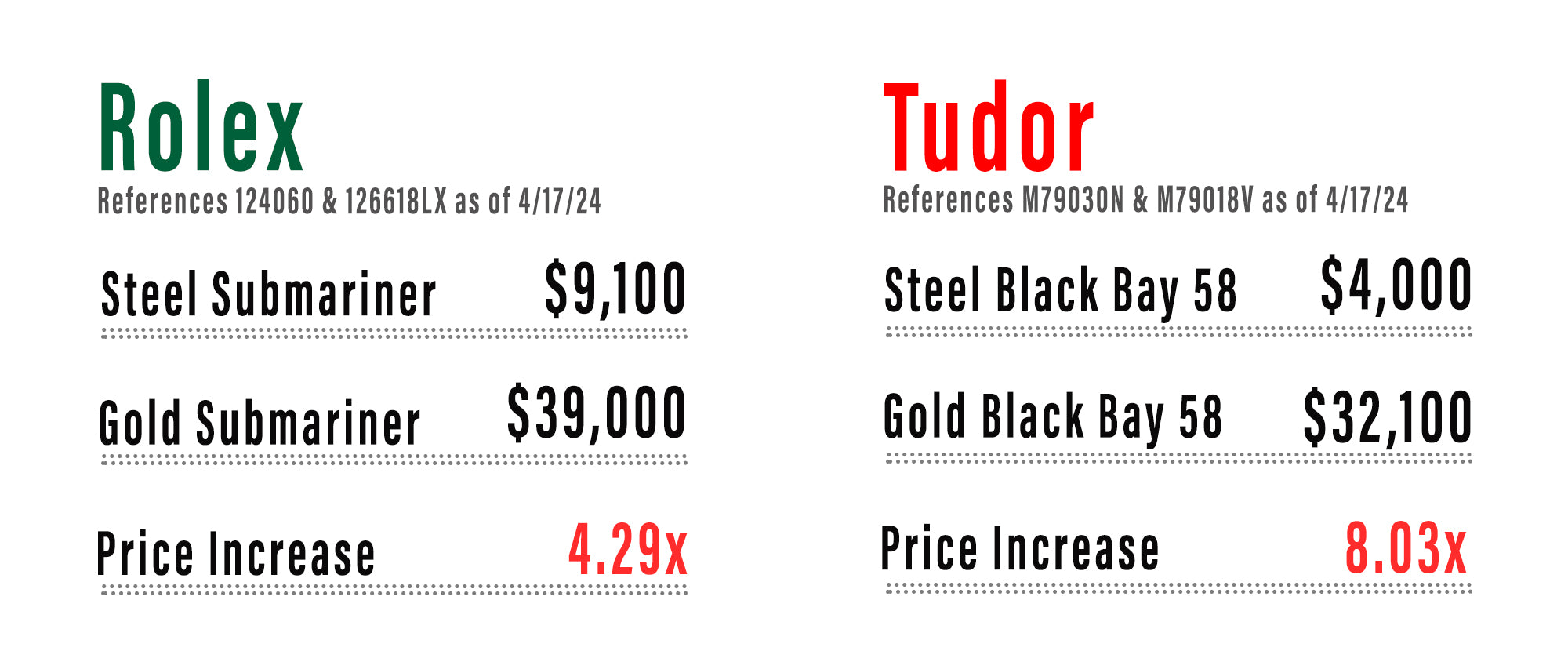Why Did Tudor Make a Solid Gold Black Bay 58? (Live Pics)

I think it’s safe to say that Tudor’s Watches and Wonders 2024 release slate was better received than Rolex’s. They unveiled a Black Bay 58 GMT: the long-awaited answer to Tudor’s perpetually chunky dual-time offerings. They released the Black Bay ‘Monochrome’: an all-black non-gilt iteration of their now-METAS-certified diver. And finally (aside from a new Clair de Rose dial), Tudor unveiled a solid 18k yellow gold Black Bay 58 with an MSRP of $32,100. One of these watches is not like the others. With the common perception that modern Rolex is moving upmarket and keeping Tudor as a strong sub-$5,000 value proposition, why would they make a solid gold Black Bay 58? What does this watch tell us about Rolex's strategy regarding Tudor's market position?
The 18k Gold Tudor Black Bay 58
First of all, this watch has existed for three years. The bracelet is the new part. In 2021, Tudor released the solid 18k yellow gold Black Bay 58: their thin 39mm heritage-inspired dive watch. It features a green aluminum bezel insert with a speckled (almost glittery) green gilt dial. The press photos don’t at all depict this texture, but in person, it’s very pronounced. Until a few days ago, this watch was only available on a brown alligator leather strap with a bonus green fabric strap. Now, it can be had on a matching 18k yellow gold bracelet equipped with a T-fit clasp. As previously mentioned, the retail price for this gold BB58 on bracelet is $32,100. If you already have the gold BB58, you will soon be able to purchase the bracelet separately for approximately $17,000 (this is the price we were told by Tudor representatives at Watches and Wonders; I was just quoted $17,500 by a Tudor boutique over the phone).

Overall, this is a very impressive watch. Not only does the widely-beloved Black Bay 58 look great in gold, it feels appropriate in satin-brushed gold. This is an important note – every surface of this watch features a brushed finish, down to the chamfers and sides of the links. Because of this finish, the all-gold BB58 is somewhat subdued, especially compared to the partially-polished gold Rolex Submariner, for instance. If you want those polished accents and/or appreciate modern Rolex’s aesthetic direction (more on that soon), you’ll have to jump up from Tudor to the Rolex Submariner 126618LX ($39,000 retail), or now, the gold Deepsea ($52,100 retail).
By design, the Tudor Black Bay 58 does not compete with the Rolex Submariner (and definitely not the Deepsea). I don’t mention these Rolex counterparts to compare value propositions, but to provide context for a broader discussion of each brand’s positioning.
Pricing The Gold Black Bay 58 . . . “Under” Rolex

The new gold BB58 plays an important role in the ongoing discussion around Rolex and Tudor’s respective market positions. It’s commonly understood that Rolex, as it exists today, has moved and will continue to move upmarket, leaving Tudor in the commercial space Rolex used to occupy and dominate (think up to 5-digit Rolex). I highly recommend Thomas van Straaten's Is This the Year I Lose Touch With Rolex? if you're interested in this topic.
This move upmarket is undoubtedly an effort to differentiate the two brands for consumers. Rolex wants to make abundantly clear the delta in quality and price between itself and Tudor. Not too long ago, Tudor simply didn’t exist in major markets largely because it was stepping on Rolex’s market share – average consumers couldn’t tell why a Rolex was more expensive than a Tudor. Since Tudor’s 2010 revival, and even leading up to it, Rolex has been climbing the ladder, increasing their prices and morphing their catalog to be a bit larger, a bit shinier, and a bit harder to obtain. The new yellow gold Rolex Deepsea, platinum guilloche 1908, and ‘Le Mans’ Daytona (especially the mythical off-catalog yellow gold version I’m hearing about) confirm this direction. Gone are the days of tool watches with modest sizing and subdued finishing: that’s now Tudor’s domain.
So, when Tudor released a solid 18K gold dive watch north of $30,000, I found myself questioning the strategy, or at least the execution: is Rolex pulling Tudor upmarket with them? A quick look at each brand’s flagship dive watch – in both steel and gold – indicates the opposite. (Yes, the core Black Bay/any Pelagos could also be considered Tudor’s flagship diver; the price difference is negligible for this example).

Obviously, the $39,000 gold Rolex Submariner (ref. 126618LX) occupies a different price tier than its $9,100 steel counterpart. However, as solid gold iterations of traditionally-steel sports watches go (a more common genre than you might think), this 4.29x increase is fairly appropriate. Sticking with this example, gold Submariners have hovered around 5x the price of their steel counterparts since they were introduced in the late ‘60s. Additionally, Rolex has catalog items that are far more expensive than $39,000; the platinum Daytona starts at $77,800 retail. Conversely, the gold Tudor Black Bay 58 is by far the brand’s most expensive offering at $32,100: a whopping 8.03x increase over the normal steel BB58. This tells me two things: I probably won’t be seeing that many full-gold 58s out there, and Tudor is positioning this watch as somewhat of a “halo product”.
When I think of the term “halo product”, I think of the automotive industry, specifically the Lexus LFA (2010-2012): an unobtainable carbon fiber monster that makes 500+ horsepower and eats other Lexuses for breakfast. The LFA exists in a different stratosphere than Lexus’ other offerings and was made primarily to garner interest in the brand as a whole. While I wouldn't say the gold BB58 is the LFA to the steel BB58’s IS 250, it does exist in a different stratosphere than all other Tudor watches. The second most expensive Tudor (besides the gold BB58 on leather), is the two-tone Black Bay 39 S&G at just $8,800. The gold BB58 is truly, in the words of Kobe Bryant, “a different animal and the same beast”.






Leave a comment